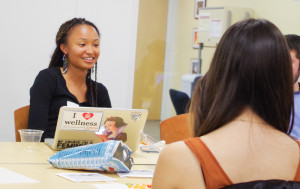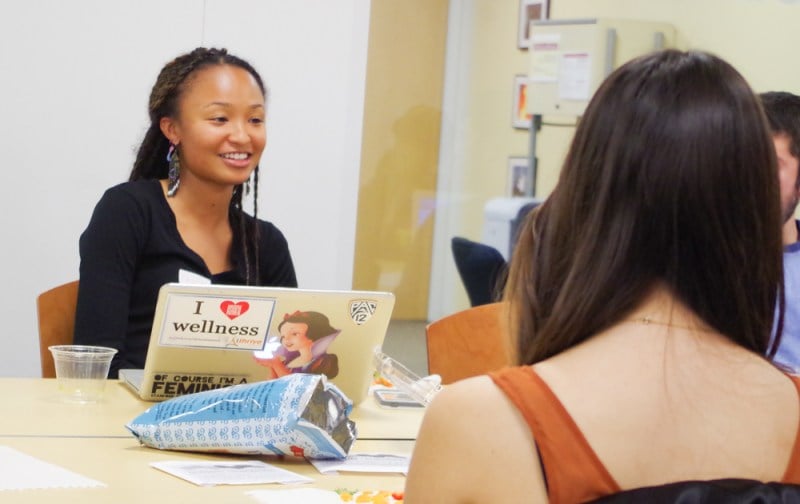As fraternity rush concludes its first week and sorority rush approaches, the challenges surrounding rush may be particularly accentuated – given the stereotypically heteronormative culture structuring Greek life – for members of Stanford’s LGBTQ community, some of whom enter the process with reservations about whether or not they will be accepted.
“I definitely had some initial hesitation and reservations about the whole process because of the fact that I am gay and because it is so traditionally heteronormative,” said Brandon Caruso ’16, a member of Sigma Nu. “Overall, there are definitely a couple of frats that I didn’t even consider, because of my personality maybe, but [also] I didn’t think I could see any gay guys going there and that kind of added to the feeling of being uncomfortable with it.”
When Rob Franklin ’15, another openly gay member of the Greek community, went through fraternity rush, he limited his choices to just two fraternities.
“The decision to rush those two was probably somewhat affected by my ideas as a freshman on which fraternities were gay-friendly,” Franklin said.
Franklin reflected that thought process might have been misguided.
“I think more of them are more gay-friendly than I would have thought as a freshman,” Franklin explained. “I have gay friends in other fraternities as well who have had completely great experiences and I don’t think that I would have thought that as a freshman.”
However, Franklin’s perspective is not uncommon, especially with regards to rush. The Panhellenic system across America is no stranger to allegations of discrimination, and the traditional gender segregation of fraternities and sororities can make them seem especially unwelcome to queer-identifying students.
Franklin stressed that despite his own positive experience, the Greek community does seem closed off to students in general – intentionally or unintentionally – and particularly to minorities.
“I think that all of the Greek organizations just need to be more cognizant of how their reputation – knowing that their reputation may be completely flawed to what the actual community is like – looks like to the average Stanford student,” Franklin said. “And if they care about that and want to change that reputation then there are ways to show that they are more welcoming communities.”
Madeleine Kane ’14, an openly queer member of Chi Omega, has worked to promote conversation and action about LGBTQ issues within Greek life.
“It seems like because people are so open here, that people kind of assume that you are okay with it,” Kane said. “But what I’ve been trying to tell people is the idea that active acceptance makes people feel a lot more comfortable than passive tolerance, and that goes for every diversity issue as far as I can tell. It’s better to just be very open and forward about it and say we welcome you here. We are not very good as a Greek community…[at] actively extending a hand.”
A bisexual member of Kappa Alpha Theta, Mary, echoed those concerns, saying that limited attempts to reach out are a bigger concern than active discrimination. Mary’s name has been changed because she preferred to remain anonymous for privacy reasons.
“We aren’t doing anything to keep those affected communities from believing that negative things happen,” she said. “We aren’t reaching out and saying ‘Come over, you’re welcome any time; please rush, we’re interested in you as a person, not you as a sexuality,’ and there’s a lot that can be done in terms of broadening our efforts to do that.”
While students agreed that the Greek community has room for growth in promoting active acceptance of sexual minorities, several students also expressed frustration with the LGBTQ community’s own discrimination against Greek life.
“I’ve met a lot of people in the LBGT groups that do feel slightly against the Greek system because they feel like there’s a drive to act a certain way within the system so they feel that it restricts your ability to be an individual,” said Jared Wolens ’16, an openly gay member of Sigma Nu. “I think that’s wrong…I’ve never once felt like I can’t act like myself. I’ve felt like I can be who I want and everyone will embrace me for that and I think that’s exactly what the LGBT groups’ mission statements are – you are who you and you should be accepted for that so I don’t see why we can’t assimilate and be one.”
Matt Higgins ’14, an openly gay member of Theta Delta Chi, explained that after several encounters with the LGBTQ community, he felt discouraged from becoming more involved.
“I was afraid I wouldn’t fit in as well in the LGBT community, based on the people I knew in it, and instead joined Theta Delt, a community I knew I was comfortable in,” he said. “I felt like more of a minority in the LGBT community than I do in the Greek community.”
Students framed the rush selection process as a key opportunity to make potential new members of all backgrounds feel welcome in Greek communities. Higgins noted that his fraternity made sure to flyer all of the community centers and all of the themed houses with rush posters in order to attract a diverse group of people to rush.
“I think the first most influential thing is not people saying ‘hey, don’t use that word’ but it’s selection during rush,” he said. “The biggest thing that any fraternity can do in approaching active acceptance is choosing to have accepting and diverse people live there.”
Franklin said he was pleasantly surprised when his fraternity voted in two openly gay guys without even considering their sexuality.
“I thought it definitely would have been discussed – not that it was any sort of factor or deterrent – but I figured that it was something that they talked about and it just wasn’t a factor,” he said.
He still asserted, however, that there is a lot more that can be done.
“I think for the other fraternities that are even interested in projecting themselves as more accepting – because I don’t think every fraternity is interested in doing that – then they could do a better job of actively showing that they’re allies if they are,” Franklin said. “Making sure that any queer people who are rushing feel comfortable to be out during rush, that the guys in the house can be vocal about the fact that there are queer people in the house and being very vocal about being accepting and allies.”
Various campus organizations have worked to improve the perception of Greek life on campus in recent years. For the past four years, the LGBT Community Resources Center and its Safe and Open Spaces at Stanford (SOSAS) program has focused specifically on addressing LGBT life within Greek organizations during winter quarter. The fraternities and sororities that accepted SOSAS panels this year include Kappa Alpha, Kappa Sigma, Phi Psi, Sigma Chi, Sigma Nu, Theta Delta Chi, Delta Delta Delta and Kappa Alpha Theta. There was also a general panel for unhoused sororities.
“So far, I’ve had really positive experiences with the Greek communities,” said Laurel Fish ’14, the SOSAS coordinator. “I think that the fraternities and sororities that I’ve been able to work with…are genuinely interested in learning and making their spaces safer. For me, it’s been a really positive experience.”
Some Greek organizations followed through on the suggestions from the SOSAS panels, putting up LGBT support flags and stickers around the house.
Mary said that Theta is very cognizant about being an inclusive community and has followed through on suggestions from SOSAS.
“Everyone’s always conscious about sending out emails saying ‘bring your date’ instead of ‘bring your man’ and all of these other seemingly small things that definitely make an impact on how welcome LGBT members feel in the Greek life,” she said.

Kane also helped put on “Diversity Office Hours” with the Greek Life Diversity Coalition on April 1.
“The idea is to sort of have a symbolic event that is publicized so that people know the door is open and that there are discussions being had,” Kane said. “It may not seem like it, but we want to make that shift so that people know the door is open for them to come to rush and be in one of these organizations if they want. Some people don’t want to and that’s fine, but to not have people think that it’s closed to begin with.”
Kane said that she has also proposed, and gotten a positive response to, adding a diversity chair to the Inter-Sorority Council (ISC) Executive Board.
“That would be ideal as an institutional push to make sure this kind of stuff is being talked about and addressed – eventually we’ll get away from just talking about it to addressing it,” she said.
Students also expressed interest in creating a council to specifically address LGBT issues within the Greek community.
“When I got here freshman year, I was a little bit surprised to realize that there were so many LGBT resources, but none of them were really affiliated to Greek life…they were very much isolated,” Wolens said. “A fraternity or sorority is going to have certain gender-normative ideas associated with them. There might be some LGBT issues that come up and there should be a resource readily available for that.”
Mary disputed the necessity of creating a new resource, but instead suggested working on creating a positive relationship between the two existing communities.
“I feel like it’s not as necessary to create new systems as it is to integrate the old ones,” she said. “It’s just as much about making people in the Greek community feel welcome for identifying as black, LGBT, what have you, as it is to make them still feel welcome in their old communities, so that they don’t have to give up something in order to join the Greek system.”
Contact Lucy Svoboda at lsvoboda “at” stanford.edu.
